From a Night Porter's Point of View is a film of genre Documentary directed by Krzysztof Kieślowski released in USA on 24 march 1979
From a Night Porter's Point of View (1979)
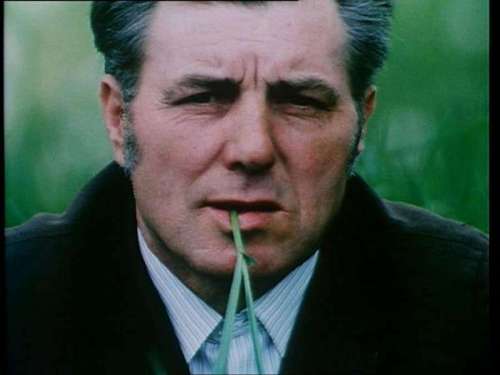
If you like this film, let us know!
Released in USA 24 march 1979
Length 16minutes
Directed by Krzysztof Kieślowski
Genres Documentary
Rating72%










From a Night Porter's Point of View (Polish: Z punktu widzenia nocnego portiera) is a 1977 documentary film by Polish filmmaker Krzysztof Kieślowski. It won the Grand Prix at the nineteenth Kraków Film Festival in 1979. The 16 minute film consists of an interview with Marian Osuch, a minor security official.
Most of the footage is of Osuch performing the various duties of his job, while he narrates his opinions on various subjects. Osuch talks mostly about his position, how he personally enjoys enforcing various bureaucratic rules, arresting petty offenders, and confiscating fishing rods. He also details his support for the government and capital punishment, saying that criticism of the government should be silenced, and that criminals should be hanged in public.
English-subtitled versions of the film are included on Polskie Wydawnictwo Audiowizualne's double-disc survey of Kieślowski's non-fiction work Polish School of the Documentary: Krzysztof Kieślowski (Region 0 PAL) and as an extra on the Artificial Eye DVD of Kieślowski's A Short Film About Killing (Region 2 PAL).
Synopsis
Un vigile de nuit d'une usine, obsédé par la discipline, au travail comme en dehors.Comments
Leave comment :
Suggestions of similar film to From a Night Porter's Point of View
There are 29 films with the same director, 8870 with the same cinematographic genres, 2422 films with the same themes, to have finally 70 suggestions of similar films.If you liked From a Night Porter's Point of View, you will probably like those similar films :
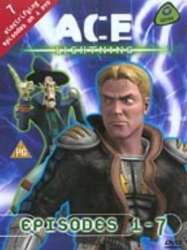
Behind the Mask (2002)
, 42minutesOrigin USA
Genres Documentary
Themes Films about music and musicians, Documentary films about music and musicians, Documentaire sur une personnalité, Musical films
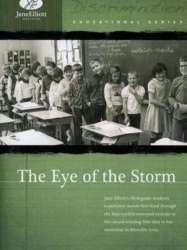
The Eye of the Storm (1970)
Origin USA
Genres Documentary
Themes Medical-themed films, Films about racism, Documentary films about racism, Documentary films about law, Documentaire sur une personnalité, Documentary films about health care, Films about psychiatry
Rating82%





William Peters follows Jane Elliott's conversely controversial and lauded schoolroom exercise of dividing an otherwise homogenous group of elementary school kids by their eye color. It was a demonstration of prejudice and discrimination meant to teach the students about the unfairness of racism, developed as a response to the shooting of Martin Luther King in April 1968. The film records Elliott in 1970 while conducting the exercise for the third time.

Masada: Live at Tonic 1999 (2004)
Genres Documentary, Musical
Themes Films about music and musicians, Documentary films about music and musicians, Documentaire sur une personnalité, Musical films
Actors John Zorn
Avec la sortie de Masada Live at Tonic 1999, Zorn et le réalisateur Antonio Ferrera visent à remédier à cela en sortant un set particulièrement chaud d'une nuit particulièrement chaude dans l'un des principaux terrains de jeu de Zorn, Tonic à New York. L'un des attraits de Tonic est sa petite taille. L'amplification est complètement inutile, et bien qu'il n'y ait pas de détails techniques répertoriés sur le DVD astucieusement emballé, le soupçon est qu'il s'agissait d'un enregistrement très simple - un certain nombre de micros de salle stratégiquement placés au-dessus de la scène et trois caméras à partir desquelles Ferrera capture comme autant que possible de l'énergie vivante qu'est Massada.
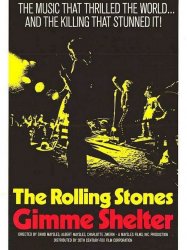
Gimme Shelter (1970)
, 1h31Origin USA
Genres Documentary, Musical
Themes Films about music and musicians, Documentary films about music and musicians, Documentaire sur une personnalité, Musical films
Actors Mick Jagger, Mick Taylor, Melvin Belli, Tina Turner
Rating77%





Ce documentaire de la tournée américaine des Rolling Stones en1969, est devenu un symbole poignant de la disparition de l'époque "Peace and Love". Après une tournée couronnée de succès au travers des Etats-Unis, les Rolling Stones effectuent en décembre un concert gratuit à Altamont Speedway en Californie. Le groupe à choisi imprudemment les Hells Angels pour assurer la sécurité. Les motards ont recours à la violence pour maintenir en ordre une foule agitée, stone, et souvent nue. Le résultat: des dizaines de blessés et la mort à l'écran d'un jeune homme noir (pendant "Sympathy for the Devil") par un membre de la sécurité. De façon arrangée, mais efficace, les frères Maysles filment Mick Jagger dans la salle de montage regardant l'assassinat projeté pour la première fois. Le film fonctionne aussi comme un documentaire du rock-and-roll, capturant la bande pendant leur moments les plus détendus, enivrant, et électrisant.
 , 2h50
, 2h50Origin United-kingdom
Genres Documentary, Musical
Themes Films about music and musicians, Documentary films about music and musicians, Documentaire sur une personnalité, Musical films
Rating86%





Filmé lors de la tournée "Hot Space Tour", ce concert complet de Queen au Milton Keynes Bowl, le 5 juin 1982 en Angleterre où le groupe a joué un certain nombre de tubes dont "We Will Rock You", "Somebody to Love", "Under Pressure", "Bohemian Rhapsody »et« Nous sommes les champions ».
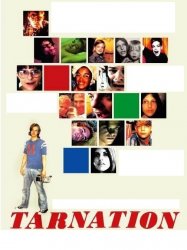
Tarnation (2003)
, 1h30Directed by Jonathan Caouette
Origin USA
Genres Drama, Documentary, Romance
Themes L'adolescence, Films about children, Medical-themed films, Psychologie, Films about sexuality, LGBT-related films, Documentary films about business, Documentary films about the film industry, Documentaire sur l'homosexualité, Documentaire sur une personnalité, Documentary films about health care, Films about psychiatry, Films about disabilities, Autobiographical documentary films, Teen LGBT-related films, LGBT-related films, LGBT-related film
Actors Jonathan Caouette
Rating70%





Tarnation est l'autoportrait de Jonathan Caouette, 31 ans, qui dès l'âge de 11 ans décide de filmer la vie chaotique qu'il mène dans une famille texane, à Houston.
 , 22minutes
, 22minutesDirected by Joseph Strick
Origin USA
Genres War, Documentary
Themes Politique, Documentary films about law, Documentary films about war, Documentary films about historical events, Documentaire sur une personnalité, Documentary films about health care, Political films
Rating73%





Le film apporte des témoignages de cinq soldats à propos du Massacre de Mỹ Lai intervenu en mars 1968 lors de la guerre du Viet Nam, et ayant fait plus de 500 victimes dont beaucoup de femmes, enfants et vieillards. Sur les 110 soldats qui ont participé au massacre, sept ayant démissionné de l'armée acceptent de témoigner, mais deux mentent en affirmant n'y avoir pas participé, et leur témoignage n'est finalement pas retenu. Sur les cinq autres, trois essayent de se justifier.

Jack Johnson (1970)
, 1h30Origin USA
Genres Documentary
Themes Sports films, Martial arts films, Boxing films, Documentary films about sports, Documentaire sur une personnalité
Actors Brock Peters
Rating71%





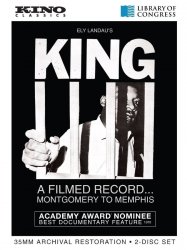 , 3h5
, 3h5Directed by Sidney Lumet, Joseph L. Mankiewicz
Origin USA
Genres Documentary
Themes Films about racism, Documentary films about racism, Documentary films about law, Documentary films about historical events, Documentaire sur une personnalité, Documentary films about politics, Political films
Actors Paul Newman, Ruby Dee, Joanne Woodward, James Earl Jones, Clarence Williams III, Burt Lancaster
Rating81%





Film biographique sur Martin Luther King Jr..
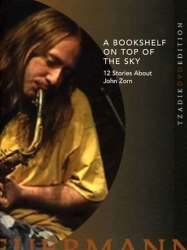
Genres Documentary, Musical
Themes Films about music and musicians, Documentary films about music and musicians, Documentaire sur une personnalité, Musical films
Actors John Zorn, Fred Frith, Mike Patton
Rating65%





 Connection
Connection